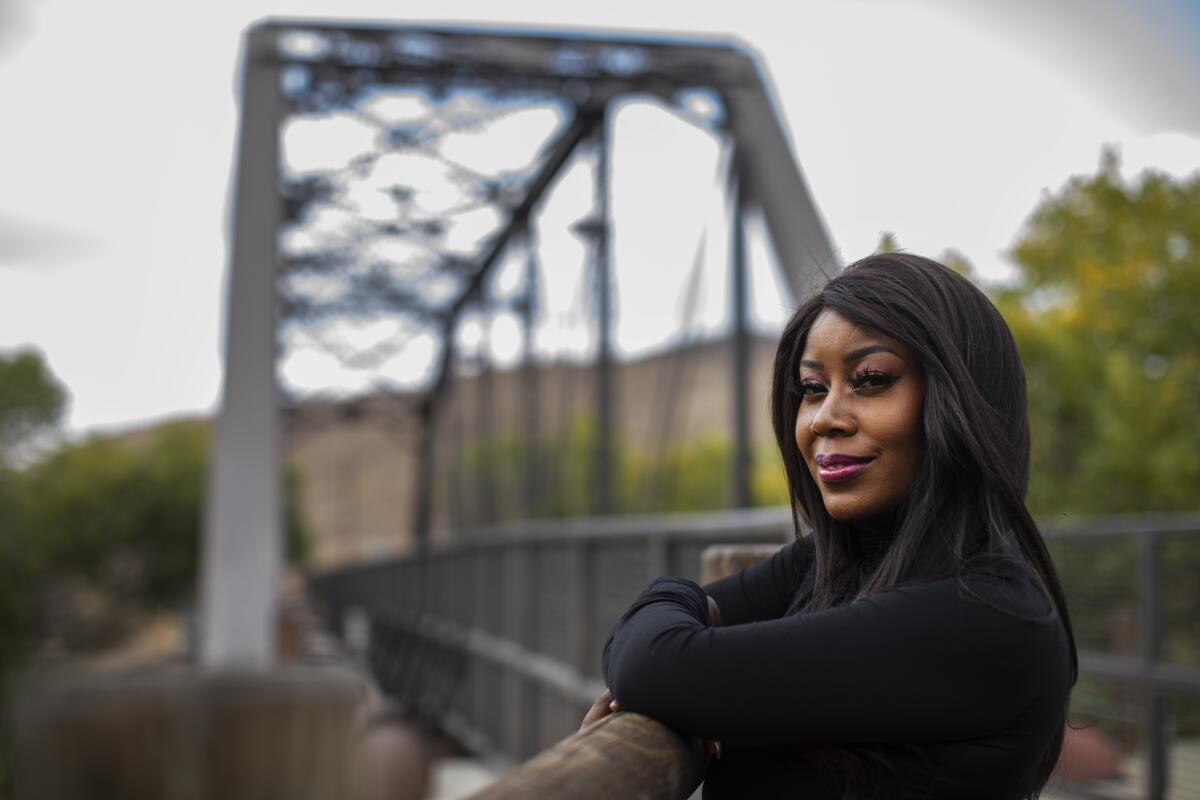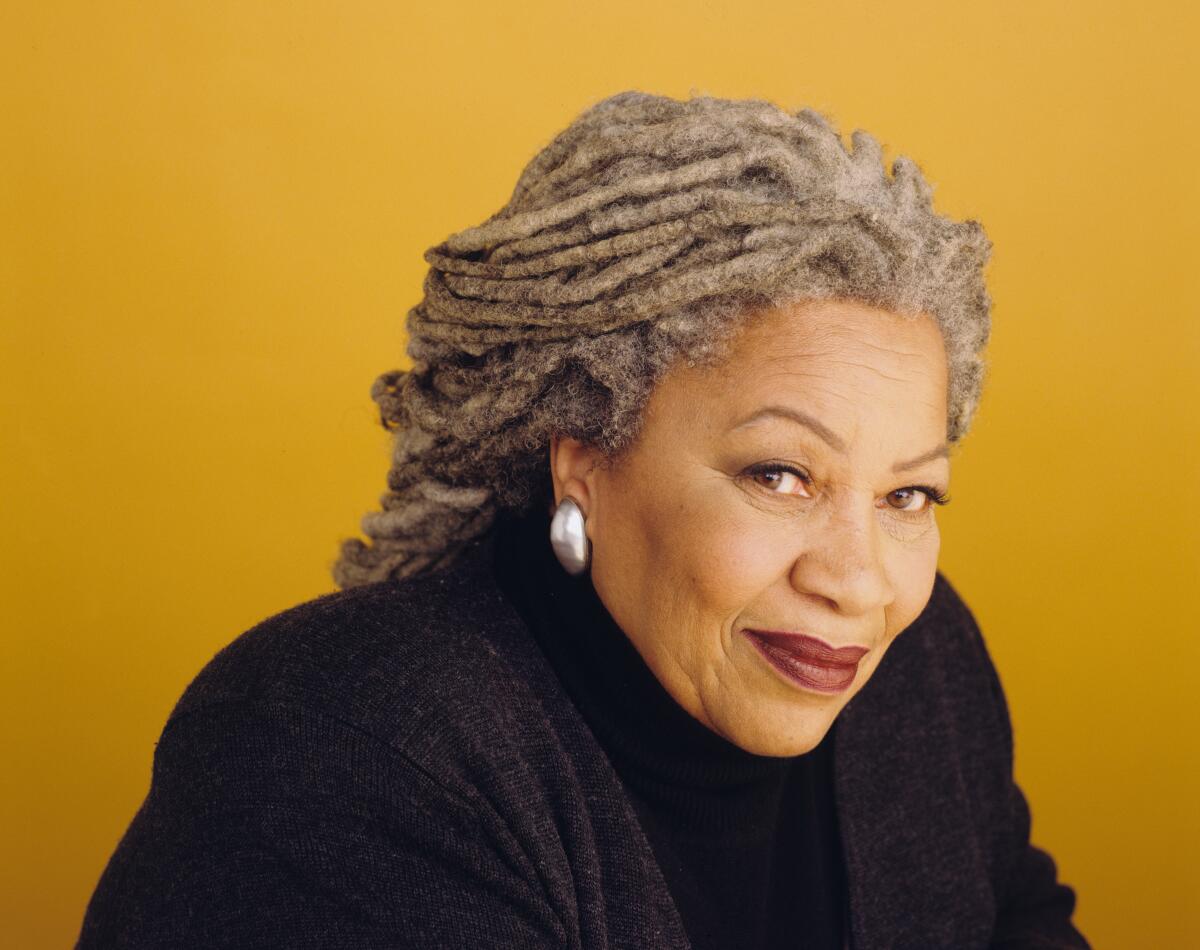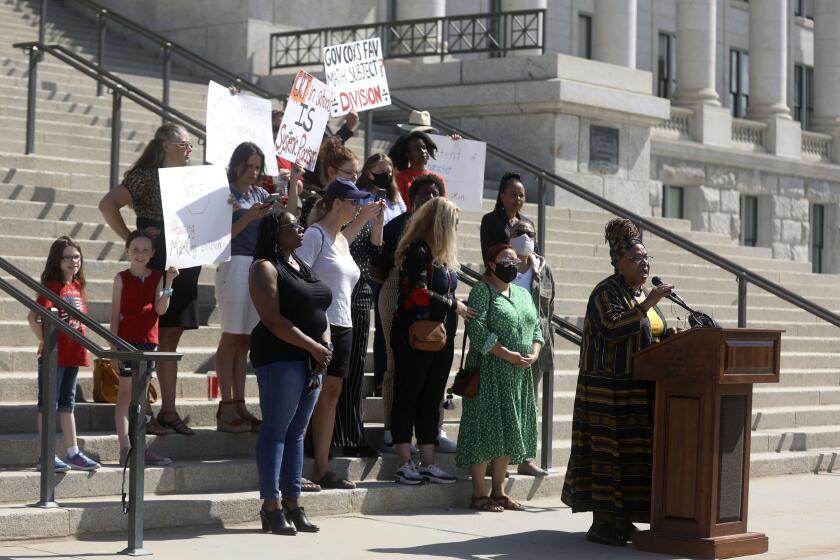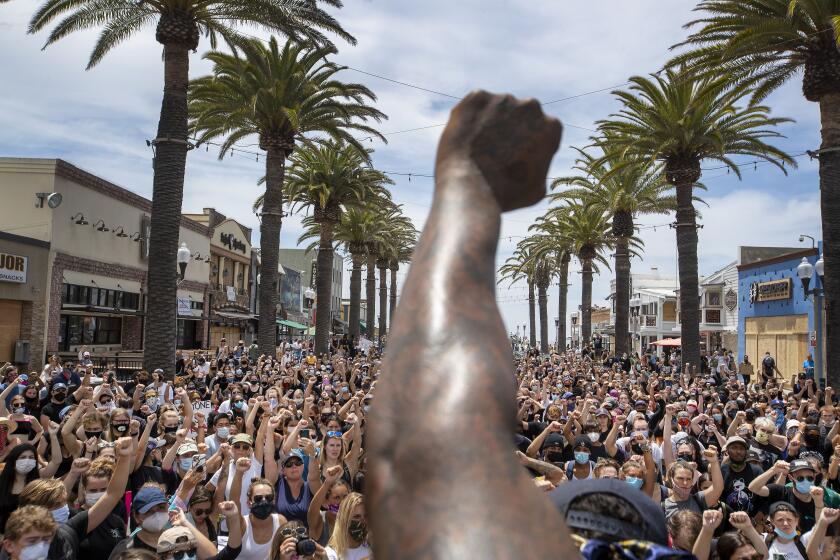Natashia Deón: Virginia’s ‘Beloved’ controversy shows there can be no healing without pain

- Share via
“Talking about feelings” is the new look for conservative campaigns throughout our nation. Specifically, addressing what makes someone, including kids, feel bad. As a mother — no, as a person concerned for the future of our nation — children’s troubles have my full attention, including conversations around literary merit in the days leading up to this week’s election of a new governor in Virginia. There, the question has become whether reading Toni Morrison’s “Beloved” would cause students discomfort in its realistic portrayal of slavery.
To bolster the conservative position, Condoleezza Rice, in an appearance on “The View,” said, “I would like Black kids to be completely empowered to know they are beautiful in their Blackness, but in order to do that I don’t have to make white kids feel bad for being white.” When I heard her say that, I wanted to say, let me show you how millions of Black children have processed that pain and grown into their empowerment despite history.
Growing up in the 1980s and ’90s in the Santa Clarita Valley, which was then a predominantly white community, my brother and I would sometimes constitute half the Black population of an entire school — an experience shared by millions of Black children. Whenever it was time to discuss American slavery in whatever grade we were in, we felt the pain of history. The heads of our white and brown classmates would pivot to find us in our shame. I know the discomfort of feeling bad about our American history. We have a shared past. Black and white and brown and Asian and Native American and more. This is the American experience.
Even as a backlash brews over teaching America’s racist history, ‘Forget the Alamo’ and ‘How the Word Is Passed’ tell of the full, inglorious past,
Don’t get me wrong. I’m not saying that because I had to put up with discomfort in school, children today should too. In fact, they are already studying American slavery. What I am saying is we can be better — and not by lying. Uncomfortable and complex emotions about the facts that got us to this point don’t make those facts inappropriate.
And here’s the point in “talking about feelings”: Feelings are necessary. Psychology teaches us that even the most logical decisions begin in an emotion. But there’s more. In my novel “The Perishing,” I wrote it this way: “Emotions are an incomplete guide. Especially love.” It’s immature and unhelpful to allow our feelings alone to be determinative as we move toward healing racial divides in this country. Is that what we’re trying to do? Or is it something else? It’s like choosing nationalism over patriotism. Nationalism is blind allegiance. Patriotism should want to see us well.

We have an opportunity as a country and as a people and, yes, even as individuals to learn from our pasts and do better. When we hold on to the myth of the good ole days and choose to scrub from the record what makes us uncomfortable, we instead romanticize history for our convenience. This kind of thinking lacks the maturity required for positive change. Without maturity, we keep spinning — new faces, same issues. And it’s time we as a country stop spinning.
The naming of critical race theory is a challenge to some for the way it’s been over-simplified by its opponents. Intentionally oversimplified. It reminds me of the defense argument in the O.J. Simpson trial years ago: “If the glove doesn’t fit, you must acquit.” I remember being a teenager, watching the trial on television with bated breath as Simpson struggled to slide his large hand into the bloody glove and when he couldn’t, I thought, welp, the glove didn’t fit, y’all must acquit. But I was a child. I didn’t understand what the DNA evidence, the cuts on his hands, the witness statements could mean. Because the glove didn’t fit.
If the standard for whether critical race theory (or a version of it) is appropriate to teach to all kids is whether they will feel bad, then we’ve missed all the evidence to be considered, and we may come to the wrong conclusion.
The Republican lawmakers removing critical race theory from the classroom seem to have no idea what it is they’re trying to ban.
As a criminal defense attorney who has spent half my 20-year career helping to clear criminal records and obtaining early release for longtime prison inmates, I have seen firsthand the pain people feel when recalling their past wrongs. Unlike the Innocence Project or similar programs advocating for people who are probably innocent, I represent clients who committed their crimes. So when I’m asking the court to show mercy, I use words like: “My client has acknowledged their wrong, has paid their debt to society, how long will we make them pay? Does that [DUI, shoplifting, eight-ball of coke] justify a life sentence? It’s been 10 years, 20, more, and it still shows up with every job application, housing application, background check … is it time now for them to be able to move on with their life without the stigma of their past?”
The point is that they are responsible. And so are we. An embarrassing number of us in the U.S. want to skip the accountability and responsibility part in the rehabilitation process. The healing process. We want to divorce ourselves from parts of the past by saying that part of history wasn’t us. “Why should I be responsible for what they did?” we ask, and in the same breath we take credit for the good parts of what they did. Well, you can. People are trying to do just that.
As a defense attorney I always acknowledge the victims, because my client’s second chance does not and should not erase the devastating losses of the past. But too many of us live like criminals without remorse, stubbornly refusing to believe our past actions have consequences. Consequences that affect not only us today but also generations to come. This is where we are as a country — a country that is made up of its history. We have an opportunity to be accountable to each other.
Walter Mosley, Luis Rodriguez, the coiner of #BlackLivesMatter and others sketch a hopeful future for L.A. and the U.S. after George Floyd protests.
As a longtime caregiver and a master’s candidate in clinical psychology at Fuller Theological Seminary, I wrestle with human suffering. Why do we suffer? I chose seminary school because I grew up in a Black church in Los Angeles; words of faith are my “first language.” I recently asked one of my clinical training mentors, Dr. Christopher Nahumck, a prominent L.A. therapist, whether he considered the hard times we face as individuals (and as a country) to be like seasons — winter, spring, summer, fall. Will they pass?
He thought about it and said, “When we suffer, we have an opportunity to be better. Maybe not as we’d hoped, but the conditions are right to encounter the presence of God.” If I’d put that into my own words, I’d say: Pain — whether our own pain, or learning of someone else’s — is a Zion. It’s the place our wisest teacher lives. I’m only sorry that so many of us were expecting a different address.
Deón is the author, most recently, of the novel “The Perishing.”
More to Read
Sign up for our Book Club newsletter
Get the latest news, events and more from the Los Angeles Times Book Club, and help us get L.A. reading and talking.
You may occasionally receive promotional content from the Los Angeles Times.












